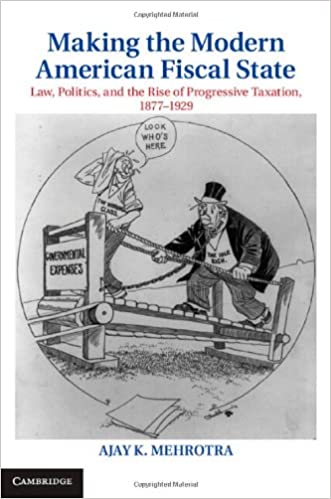Editor's Note
“This project is—in some ways—a subset of the classic Werner Sombart question: why not socialism in America?”—Ajay K. Mehrotra
 Greetings, colleagues! We’re sitting down with past USIH prize winners to hear what they’re working on now, and to see how their scholarship connects to our #USIH2020 conference theme of “Revolution & Reform.” We chatted with Ajay K. Mehrotra, professor of law at the Northwestern Pritzker School of Law, who also serves as the executive director and a research professor at the American Bar Foundation. Check out Mehrotra’s The Making of the Modern American Fiscal State: Law, Politics, and the Rise of Progressive Taxation, 1879-1929, which won the 2014 USIH Book Prize. Psst, #USIH friends! There’s still time to enter YOUR book. Entries are due 15 April 2020 and you can find all the prize submission details here.
Greetings, colleagues! We’re sitting down with past USIH prize winners to hear what they’re working on now, and to see how their scholarship connects to our #USIH2020 conference theme of “Revolution & Reform.” We chatted with Ajay K. Mehrotra, professor of law at the Northwestern Pritzker School of Law, who also serves as the executive director and a research professor at the American Bar Foundation. Check out Mehrotra’s The Making of the Modern American Fiscal State: Law, Politics, and the Rise of Progressive Taxation, 1879-1929, which won the 2014 USIH Book Prize. Psst, #USIH friends! There’s still time to enter YOUR book. Entries are due 15 April 2020 and you can find all the prize submission details here.
What are you working on now?
Ajay K. Mehrotra: I’ve just embarked on a new twentieth-century comparative history project exploring why the United States is the only industrialized democracy without a national consumption tax. All other OECD countries have a national consumption tax, in the form of a value-added tax (VAT), that funds a tremendous amount of social welfare spending, from national health care to free college tuition to universal child care. The United States is the exception, I believe, for a variety of historical reasons.
This new project follows up on my first book (The Making of the Modern American Fiscal State: Law, Politics, and the Rise of Progressive Taxation, 1879-1929) both chronologically and thematically. Chronologically, I plan to trace how the ideas of key economists, jurists, social activists, and lawmakers shaped twentieth-century tax policy in ways the diverged from what other advanced economies were doing. Thematically, I try to explain why the U.S.’s commitment to the direct and progressive taxation of income and inheritances prevented American policy analysts and lawmakers from experimenting with other types of taxes (i.e. crude consumption taxes) that could have underwritten the development of a modern and robust social-welfare state. In short, I think I am trying to write a legal/intellectual history of “why no VAT in the United States?” If my premises are accurate, this project is—in some ways—a subset of the classic Werner Sombart question: why not socialism in America? Or perhaps more accurately (and modestly) why so little social-welfare spending in America.
 Within our field of intellectual history, what topics or approaches are you excited about?
Within our field of intellectual history, what topics or approaches are you excited about?
Mehrotra: I am excited to see that our field continues to broaden and diversify our topics and approaches without losing the core sense of intellectual history or the history of ideas. Even a quick glance at recent conference programs and blog posts shows that members of our growing community are embracing all types of intellectual history, from the many facets of African American intellectual history, to the origins and development of key cultural concepts, to ideas about law and political economy (my own area of research). It is equally exciting to see graduate students and early-career scholars participating enthusiastically in our field. This combination of new subfields and new participants, I believe, bodes well for the future of intellectual history.
This year, our annual meeting theme is “Revolution and Reform.” Can you reflect on how those ideas connect to your scholarship?
Mehrotra: Like many historians, I write about change over time. More specifically, I’ve been interested in how ideas about American law and political economy have shaped the changing relationship among fiscal policy, state-building, and citizenship. My first book was about the “fiscal revolution” that occurred at the turn of the twentieth century when the United States first adopted direct and progressive taxes on income and wealth-transfers and how that revolution both combatted and, in some cases, potentially exacerbated economic inequality. In my new project, I am trying to understand the failures of past reformers to revolutionize our fiscal state in subsequent decades. I look forward to the next annual meeting to learn how other colleagues are engaging with this important theme.

0